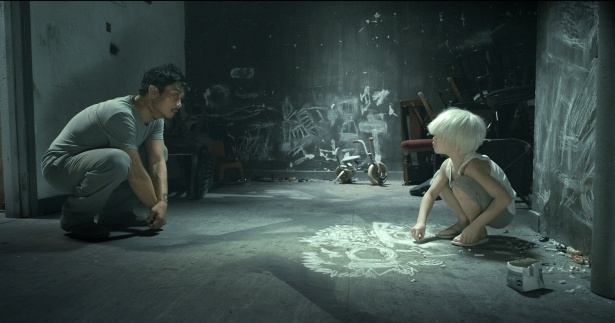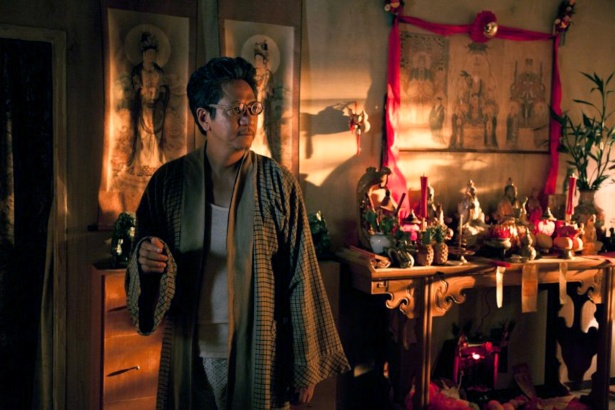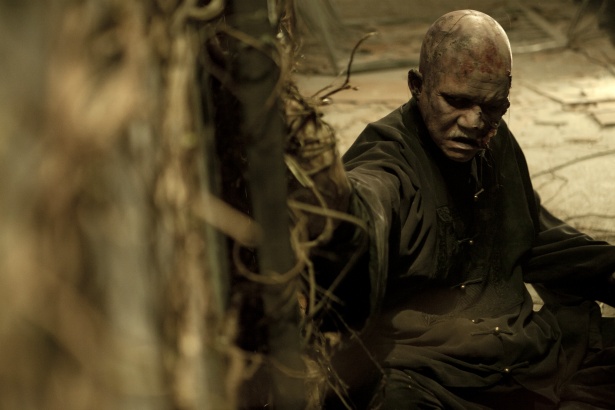
“Should I get some blood from a black dog too?”
Rigor Mortis opens with a haunting rendition of Gwai San Neung (Ghost Bride) while the camera hovers over bloodied characters on the floor that look like they’ve just been in the apocalypse. Scattered about are a wooden sword, a lot of threading (most likely coated in chicken’s blood) and a burning ofuda. As a homage to Hong Kong horror classics such as A Chinese Ghost Story, Spooky Encounters, and most of all Mr. Vampire (of which there are a string of sequels and spin-offs), anyone that has been immersed in those films will get the references.
A former actor, Chin Siu-ho (one of the stars of Mr. Vampire, who bizarrely is playing a fictional version of himself) checks himself into room 2442 at a rundown apartment building, intending to put an end to his life. However, he is unaware of what took place in this room before his arrival. After ghostly spirits battle to take over his body, Siu-ho is saved by Taoist master turned cook Yau (Anthony Chan). He then finds himself learning more about the inhabitants of the building. These include the troubled Yeung (Kara Hui) and her son Pak who pass Siu-ho’s apartment every day; caretaker Uncle Yin (Lo Hoi Pang); heavy smoker and dark arts specialist Gau (Chung Fat); and seamstress Auntie Mui (Nina Paw), whose efforts to try and revive her husband result in a frightening turn of events.
From singer and actor Juno Mak, his directorial debut pays homage to the Hong Kong horror films that were generally light-hearted, fun and humorous (even dedicating his film to actors Lam Ching Ying and Ricky Hui, both of whom starred alongside Siu-ho in Mr. Vampire). The Grudge’s Takashi Shimizu is also onboard as a producer and his influence can be felt, particularly when the ghosts of twin long-haired sisters make an appearance.
As the film progresses it would appear that Mak is using the horror genre to tell a different story. Rigor Mortis is deadly serious. While it’s by no means worse off for going down this route, those looking for the same kind of 1980s thrills will instead receive an assault on the senses. Mak’s film is dark, violent, unrelenting and powerful. Never before has a child asking to go pee been treated with utter dread.
Mak has put together a stellar cast of veteran actors. Siu-ho mainly works as a guide in allowing us to know more about the building and its inhabitants. He slowly ends up sidelined while the lives of the other characters take over and doesn’t really get his moment of action till the final third.
Siu-ho is largely overshadowed by Anthony Chan, who also appeared in Mr. Vampire and hasn’t been seen on screen for almost two decades. As the Taoist master Yau, Chan pushes through with a performance that elevates the film and makes you wonder what it would be like seeing this character as a lead in a separate feature. Despite walking around in boxers and a dressing gown during the entire film, he still manages to look effortlessly cool and even works a conversation about glutinous rice into something deeply meaningful (notably, glutinous rice was “not just used for cooking”).
Rounding off the cast is martial arts legend Chung Fat as the sinister Gau; Nina Paw as Auntie Mui, whose delightful demeanour slowly descends to madness, and Richard Ng in a brief role as her husband Tung.
The level of supernatural threat the residents are dealing with here would normally be reason enough to vacate the building, let alone call a professional. The threat is contained to the apartment building, which keeps the whole malevolence of a vampire and ghosts somewhat low-key, yet whenever they appear on screen Mak heightens everything about them, exaggerating their looks, their actions and even how they sound. In fact, the film is a masterclass in sound design. In Dolby surround each supernatural encounter is ear-piercingly horrifying (there is no such thing as a quiet death here).
It is also incredibly violent. During some scenes Mak does not let the camera shy away, allowing the audience to see cuts and stabbings, as well as close-ups of gaping wounds. One character is bludgeoned in the head repeatedly, resulting in more blood than is humanly possibly spurting all over the place – even on the camera lens (the graphic nature of this sequence actually caused one person to get up and walk out). At one point, while we don’t exactly witness the death of a young child, a character walks in on the aftermath, which is just as disturbing.
“All the vampires have miraculously vanished, along with all the vampire hunters,” says Yau, almost as if he’s making a reference to past films. But the sentiment here is that the change in times has resulted in people who have outlived their usefulness only to end up lost and forgotten, as is the case with the characters here. Some of them are also clinging to past memories and relics that they just can’t shake.
Siu-ho and Yau in particular are washed up heroes that don’t necessarily want to be fighting anymore but are compelled to when evil turns up at their building. They’re not doing it because it’s their job, or because they’ve been called to, but because there simply isn’t anyone left. For Siu-ho, after the initial willingness to end it all, the sudden vampire on the loose gives him a shot at redemption.
Mak has done his homework, not only by his choice of cast, but also by incorporating little details that equally hold significance and reference past films, such as the use of spells, incantations, mirrors and holding one’s breath. However, by doing this he seems to expect his audience to be just as clued up. Newcomers to the Chinese vampire (Jiangshi) may find this a difficult experience for there is little in the way of explanations, while a slightly convoluted second half could leave some viewers scratching their heads wondering what exactly they just sat through.
On a technical level, visually and aurally, it’s a delight (the cinematography by Ng Kai Ming is eerily beautiful), but the story is certainly an acquired taste. It has been years since audiences have seen anything quite like this before and for aficionados of this long lost sub-genre, Rigor Mortis is an absolute must, only because it might be a number of years before they see anything quite like this again.
Originally published on MCM Buzz on 31 October 2013.




